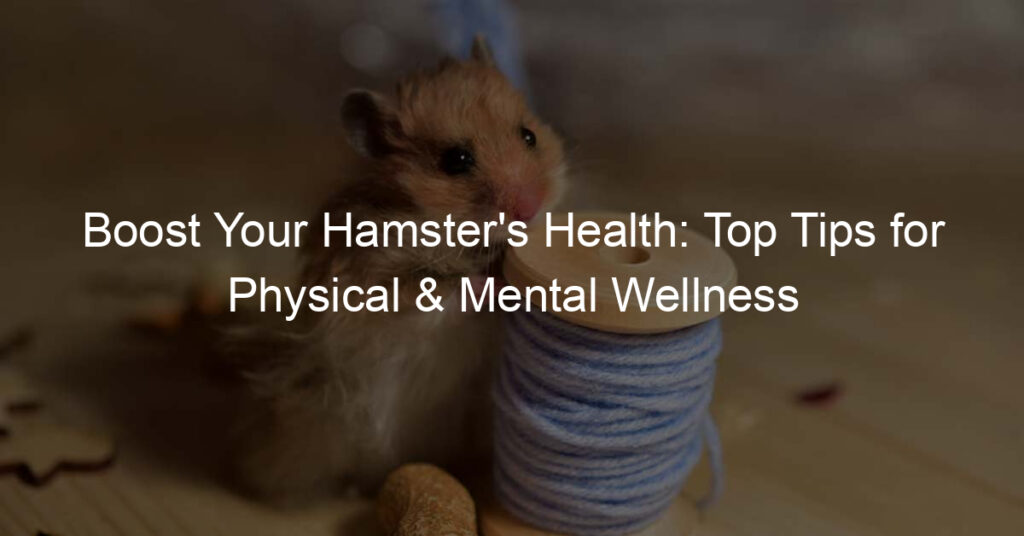
Introduction to Hamster Health
Hamsters are small, furry, and adorable creatures that make great pets. However, like any other pet, they require proper care and attention to ensure they live a healthy and happy life. This article aims to provide a comprehensive guide on hamster health, focusing on the importance of promoting their well-being, understanding their physical and mental health needs.
- Importance of Promoting Hamster Health
- Understanding Physical Health for Hamsters
- Understanding Mental Health in Hamsters
Hamsters, just like humans, need to be healthy to live a long and happy life. A healthy hamster is active, playful, and curious. They have a glossy coat, clear eyes, and a good appetite. Promoting hamster health not only ensures your pet’s longevity but also prevents the onset of diseases that could lead to discomfort or even premature death. It’s important to remember that a healthy hamster is a happy hamster.
Physical health in hamsters involves more than just feeding them properly. It includes regular exercise, proper grooming, and regular vet check-ups. Hamsters need a balanced diet rich in proteins, fruits, and vegetables. They also need plenty of exercise to prevent obesity, which is a common health issue in hamsters. A hamster wheel in their cage can provide the necessary exercise. Regular grooming helps to keep their fur clean and free from parasites, while regular vet check-ups ensure any health issues are detected and treated early.
Mental health in hamsters is often overlooked but is equally important. Hamsters are intelligent creatures that need mental stimulation to prevent boredom and depression. This can be achieved by providing them with toys, tunnels, and other forms of enrichment in their cage. Interaction with their human caregivers also plays a crucial role in their mental well-being. A bored or depressed hamster may become lethargic, lose its appetite, or even start to exhibit destructive behaviors. Therefore, understanding and catering to your hamster’s mental health needs is vital to their overall well-being.
Hamster Wellness Guide
Keeping your hamster healthy and happy is a top priority. This guide will help you understand what physical wellness means for your hamster, the factors that can affect it, and common health issues to watch out for.
Physical Wellness
Physical wellness in hamsters is about more than just avoiding illness. It’s about promoting a lifestyle that helps your hamster thrive.
-
Hamster physical wellness: What does it mean?
Physical wellness for a hamster means they are not only free from illness, but they are also active and engaged in their environment. A physically well hamster will have a healthy appetite, a shiny coat, and bright, alert eyes. They will also be active, exploring their cage, running on their wheel, and engaging with their toys.
-
Key factors affecting hamster’s physical health
Several factors can affect your hamster’s physical health. These include diet, exercise, and environment. A balanced diet is essential for keeping your hamster healthy. They need a mix of fruits, vegetables, and high-quality hamster pellets. Exercise is also crucial. Hamsters are active animals and need plenty of opportunities to run, climb, and play. Finally, the environment can play a big role in your hamster’s health. A clean, safe, and stimulating cage is essential for your hamster’s wellbeing.
-
Common physical health issues in hamsters
Like all pets, hamsters can suffer from a variety of health issues. Some of the most common include respiratory infections, wet tail (a serious form of diarrhea), and tumors. Hamsters can also suffer from dental problems, so it’s important to provide them with plenty of chew toys to help keep their teeth healthy and short.
By understanding what physical wellness means for your hamster and the factors that can affect it, you can take steps to ensure your pet lives a long, healthy, and happy life.
Mental Wellness
Just like humans, hamsters also require a healthy state of mind to live a happy and fulfilling life. This section will delve into the mental wellness of hamsters, what it means, the key factors affecting it, and the common mental health issues they face.
- Hamster mental wellness: What does it mean?
Mental wellness in hamsters refers to their emotional and psychological well-being. It’s about how they feel, how they behave, and how well they can cope with day-to-day life. A mentally healthy hamster is active, curious, and shows interest in its surroundings. They enjoy playing, exploring, and interacting with their owners.
- Key factors affecting hamster’s mental health
Several factors can impact a hamster’s mental health. These include:
| Factor | Description |
|---|---|
| Environment | A hamster’s cage should be clean, spacious, and enriched with toys and activities to keep them mentally stimulated. |
| Social Interaction | Hamsters are solitary animals, but they still need some level of interaction with their owners to remain mentally healthy. |
| Diet | A balanced diet is essential for a hamster’s mental well-being. Lack of certain nutrients can lead to stress and anxiety. |
- Common mental health issues in hamsters
Hamsters can suffer from a range of mental health issues. The most common ones include:
- Stress: This can be caused by a variety of factors, such as a change in environment, lack of social interaction, or an improper diet.
- Anxiety: Hamsters can become anxious if they feel threatened or unsafe in their environment.
- Depression: Yes, even hamsters can get depressed. Signs of depression in hamsters include lack of activity, loss of appetite, and disinterest in their surroundings.
Understanding and addressing these mental health issues can greatly improve your hamster’s quality of life. Remember, a happy hamster is a healthy hamster!
Tips for Healthy Hamsters
Keeping your hamster healthy involves more than just providing food and water. Here are some essential physical health tips to ensure your furry friend stays in top shape.
Physical Health Tips
-
Exercise: Importance and Best Practices
Exercise is crucial for your hamster’s health. It helps keep their heart strong, prevents obesity, and can even improve their mood. Hamsters are naturally active creatures, especially at night. Providing an exercise wheel in their cage is a great way to ensure they get enough physical activity. Make sure the wheel is solid, not wire, to prevent injuries.
-
Diet: What to Feed Your Hamster for Optimal Health
A balanced diet is key to keeping your hamster healthy. Hamsters need a mix of fruits, vegetables, grains, and protein. Commercial hamster food often provides a good balance, but you can also supplement with fresh foods. Avoid feeding your hamster junk food or anything high in sugar or fat. Remember, a healthy hamster is a happy hamster!
-
Regular Vet Check-ups: Why They Matter
Just like humans, hamsters can benefit from regular check-ups with a vet. These visits can help catch any potential health issues early, before they become serious. Your vet can also provide advice on diet, exercise, and other aspects of hamster care. Remember, prevention is always better than cure.
By following these tips, you can ensure your hamster stays healthy and happy. Remember, a healthy hamster is not just a pet, but a companion who brings joy and happiness to your life.
Mental Health Tips for Hamsters
Just like humans, hamsters also need to maintain their mental health for overall well-being. Here are some tips to help keep your hamster’s mind sharp and happy:
-
Stimulation: Toys, puzzles, and more
Hamsters are naturally curious creatures. Providing them with toys and puzzles can help stimulate their minds and keep them active. For example, a simple hamster wheel can provide hours of entertainment and exercise. Other toys such as tunnels, bridges, and chew toys can also keep your hamster engaged. Remember, a stimulated hamster is a happy hamster!
-
Socialization: The role of companionship in mental health
Hamsters are social animals. They enjoy the company of their own kind and humans too. Spending time with your hamster, handling them gently, and talking to them can help improve their mental health. However, it’s important to note that not all hamsters like to share their space. Some prefer to live alone, so always respect your hamster’s individual preferences.
-
Environment: Creating a stress-free habitat
The environment in which your hamster lives plays a significant role in their mental health. A clean, spacious cage with plenty of hiding spots can help create a stress-free habitat for your hamster. Make sure to clean the cage regularly and provide fresh bedding. Also, keep the cage in a quiet, well-lit area to avoid causing stress to your hamster.
| Category | Tip |
|---|---|
| Stimulation | Provide toys and puzzles to keep your hamster engaged and active. |
| Socialization | Spend time with your hamster and respect their individual preferences. |
| Environment | Create a clean, spacious, and stress-free habitat for your hamster. |
Remember, a happy hamster is a healthy hamster. By following these tips, you can help ensure your hamster’s mental health is in top shape!
Maintaining Hamster Health
Keeping your hamster healthy is a crucial part of being a responsible pet owner. This section will guide you on how to maintain your hamster’s health, including preventive measures for common health issues, monitoring your hamster’s health, and knowing when to seek professional help.
- Preventive Measures for Common Health Issues
- Provide a balanced diet: Hamsters need a variety of foods to stay healthy. This includes fresh fruits, vegetables, and high-quality hamster pellets.
- Ensure regular exercise: Hamsters are active creatures. Providing them with a hamster wheel and toys can help them stay fit and healthy.
- Keep their cage clean: Regularly cleaning your hamster’s cage can prevent diseases caused by bacteria and parasites.
- Monitoring Your Hamster’s Health: What to Look For
- Changes in behavior: If your hamster is less active than usual, it might be a sign of illness.
- Changes in eating or drinking habits: If your hamster is eating or drinking less or more than usual, it could indicate a health problem.
- Physical changes: Look for changes in your hamster’s weight, fur, or skin. Any changes could be a sign of illness.
- When to Seek Professional Help
- If your hamster has been injured
- If your hamster is not eating or drinking
- If your hamster shows signs of illness, such as lethargy, changes in behavior, or physical changes
Preventing health issues is always better than treating them. Here are some preventive measures you can take:
Regularly checking your hamster’s health can help you spot any potential issues early. Here’s what to look for:
While you can do a lot to maintain your hamster’s health at home, there are times when you should seek professional help. This includes:
In conclusion, maintaining your hamster’s health involves regular monitoring, preventive measures, and knowing when to seek professional help. By following these steps, you can ensure your hamster lives a long, healthy, and happy life.
Improving Hamster Health
Improving your hamster’s health is a crucial part of pet ownership. This section will guide you on how to enhance your hamster’s physical health, particularly if your pet is overweight or dealing with common health issues.
Physical Health Improvement
Physical health is a key aspect of your hamster’s overall well-being. Here are some steps you can take to ensure your hamster stays in top shape.
- Steps to take if your hamster is overweight
- Monitor their diet: Ensure your hamster is eating a balanced diet. Avoid feeding them too many treats or high-fat foods.
- Encourage exercise: Provide your hamster with plenty of opportunities for physical activity. A hamster wheel is a great way to help your pet burn off excess calories.
- Regular vet check-ups: Regular vet visits can help monitor your hamster’s weight and provide guidance on diet and exercise.
- Recovering from common physical health issues
- Follow vet instructions: Always follow the treatment plan provided by your vet. This may include medication, diet changes, or special care instructions.
- Provide a comfortable environment: Make sure your hamster’s cage is clean, warm, and quiet to help them recover.
- Monitor their behavior: Keep an eye on your hamster’s behavior. If they seem lethargic, uninterested in food, or show other signs of illness, contact your vet immediately.
Overweight hamsters can face numerous health issues. Here’s what you can do to help your hamster lose weight:
Hamsters can suffer from a variety of health issues. Here’s how to help your pet recover:
Remember, the key to improving your hamster’s physical health is a balanced diet, regular exercise, and attentive care. With these steps, you can ensure your hamster lives a long, healthy, and happy life.
Mental Health Improvement
Just like humans, hamsters can experience stress and anxiety, which can impact their overall mental health. It’s important to recognize the signs and know how to help your furry friend. Here are some steps you can take if your hamster is showing signs of stress or anxiety and tips on recovering from common mental health issues.
- Steps to take if your hamster is showing signs of stress or anxiety
- Recovering from common mental health issues
- Provide a safe and comfortable environment for your hamster. This includes a clean cage, plenty of food and water, and a quiet place to rest.
- Engage your hamster in stimulating activities. This can help reduce boredom and stress.
- Monitor your hamster’s behavior closely. If you notice any changes, it’s important to act quickly.
- Don’t hesitate to seek professional help. Vets can provide guidance and treatment options to help your hamster recover.
Hamsters may exhibit stress or anxiety through behaviors such as excessive grooming, loss of appetite, or unusual aggression. If you notice these signs, it’s important to take action.
| Step | Action |
|---|---|
| 1 | Reduce any potential stressors in their environment. This could include loud noises, other pets, or sudden changes in their habitat. |
| 2 | Provide plenty of opportunities for exercise and mental stimulation, such as a running wheel or maze toys. |
| 3 | Ensure your hamster has a balanced diet. Lack of proper nutrition can contribute to stress and anxiety. |
| 4 | If the signs persist, consult with a vet. They can provide professional advice and treatment options. |
Recovering from mental health issues in hamsters involves a combination of environmental changes, proper nutrition, and sometimes, professional help. Here are some tips:
Remember, your hamster’s mental health is just as important as their physical health. By recognizing the signs of stress and anxiety and knowing how to help, you can ensure your hamster lives a happy and healthy life.








